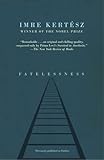It’s becoming a tradition of sorts, the Nobel jury gives the Prize to an author virtually unknown in the United States, and newspaper columnists grumble while small and university presses bask in a moment of publishing glory.
Nobody outside a few square miles in New York cares that this year’s Pulitzer or Booker winner was put out by Random House or HarperCollins, but even to the casual observer of the literary scene, there’s something refreshing (and, for some, aggravating) about seeing yet another Nobel winner with only the faintest, most haphazard publishing footprint. The Nobel Prize, probably half the time, shines a huge spotlight some pretty obscure books.
For small and university presses, the Prize is a rare moment of popular notice. Daniel E. Pritchard who works for David R. Godine, Publisher in Boston wrote as much a year ago reacting to J.M.G. Le Clézio’s Nobel win, “Nobel Prizes are usually the playground for big boys. They were noticeably absent from this one, leaving all the fame and street-cred for small independents.” Godine published Le Clézio’s The Prospector.
The University of Nebraska Press also published Le Clézio, with two books in print when the Nobel was announced last year: The Round and Other Cold Hard Facts and Onitsha. According to the press’ publicity manager Cara Pesek, Nebraska sold just “a handful” of copies of both titles in 2007, but “since the prize was announced last year, those two titles have accounted for more than $100,000 in incremental sales.”
 With Herta Müller’s win, Nebraska has now struck Nobel gold two years in a row. Pesek said that the day after the Nobel was announced, the press had 3,000 backorders for Müller’s book Nadirs.
With Herta Müller’s win, Nebraska has now struck Nobel gold two years in a row. Pesek said that the day after the Nobel was announced, the press had 3,000 backorders for Müller’s book Nadirs.
The director of University of Nebraska Press, Donna Shear, tempered the excitement somewhat, saying that the Nobel turns a book into “a steady backlist seller” as it finds its way onto University reading lists. But she added that a side-effect of the Nobel jury’s idiosyncrasies is that the Prize becomes “a validation of the efforts of University presses.”

 The Euro-centric Nobel also injects some commercial viability into the typically limited world of literature in translation. After winning the Nobel in 2002, Hungarian writer Imre Kertész went from university presses to Knopf and Vintage. Meanwhile, plans are already underway to bring Müller to a wider audience. Shear said Nebraska put in a bid for Müller’s latest, Atemschaukel, recently shortlisted for the German Book Prize, but it’s expected that the book will land with one of the big publishing houses.
The Euro-centric Nobel also injects some commercial viability into the typically limited world of literature in translation. After winning the Nobel in 2002, Hungarian writer Imre Kertész went from university presses to Knopf and Vintage. Meanwhile, plans are already underway to bring Müller to a wider audience. Shear said Nebraska put in a bid for Müller’s latest, Atemschaukel, recently shortlisted for the German Book Prize, but it’s expected that the book will land with one of the big publishing houses.
We expect our book prizes to confirm that a book or author’s commercial success and positive reviews are well-deserved. Sometimes the Nobel plays this role – a validator of critical opinion – but, for the American audience, it often does something different. And this is where the grumbling comes in. We don’t like to be told that an author we’ve never heard of is one of the greatest ever. But in cases like Müller and Kertész and Le Clézio, the Nobel serves as a reminder that in certain corners of the publishing industry, there are presses shepherding the work of these writers into print and keeping it available until such time as the rest of us are able to take notice.






